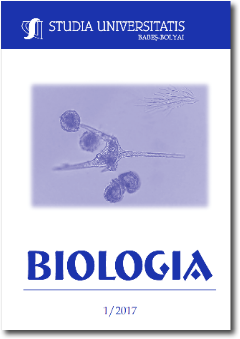SPION size dependent effects on normal and cancer cells
DOI:
https://doi.org/10.24193/subbb.2017.1.02Keywords:
hyperthermia, melanoma cells, SPION.Abstract
Iron oxide nanoparticles have become widely used today in medical applications. In this study, we report a hyperthermia treatment with 10 and 100 nm naked and polyethylene glycol(PEG)-coated Super Paramagnetic Iron Oxide Nanoparticles (SPIONs) to normal and tumor cells in culture. Cells’ responses to nanoparticles were analyzed by cell viability assays (MTT and LDH) and transmission electron microscopy. Results indicate that even if 10 nm SPIONs have good magnetization saturation, the hyperthermia treatment is not effective due to the fact that cells do not endocytose them. 100 nm SPIONs are better engulfed by cells, and their hyperthermia effect is slightly increased.
References
Atkinson, W. J., Brezovich, I. A., Chakraborty, D. P. (1984) Usable frequencies in hyperthermia with thermal seeds, IEEE Trans. Biomed. Eng. 31:70–75
Bañobre-López, M., Teijeiro, A., Rivas, J. (2013) Magnetic nanoparticle-based hyperthermia for cancer treatment, Reports of Practical Oncology & Radiotherapy, 18(6):397–400
Blasiak, B., van Veggel, F. C. J. M., Tomanek, B. (2013) Applications of Nanoparticles for MRI Cancer Diagnosis and Therapy, Journal of Nanomaterials, 2013: 12
Chan, F. K. -M., Moriwaki, K., De Rosa, M. J. (2013) Detection of Necrosis by Release of Lactate Dehydrogenase (LDH) Activity, Methods in molecular biology, 979:65-70
Coral, D. F., Mendoza Zélis, P., Marciello, M., del Puerto Morales, M., Craievich, A., Sánchez, F. H., Fernández van Raap, M. B. (2016) Effect of Nanoclustering and Dipolar Interactions in Heat Generation for Magnetic Hyperthermia, Langmuir, 32(5):1201–1213
Craciunescu, I., Petran, A., Liebscher, J., Vekas, L., Turcu, R. (2017) Synthesis and characterization of size-controlled magnetic clusters functionalized with polymer layer for wastewater depollution, Materials Chemistry and Physics, 185:91–97
Das, M., Ansari, K. M., Tripathi, A., Dwivedi, P. D. (2011) Need for safety of nanoparticles used in food industry, J. Biomed. Nanotechnol., 7(1):13-4
Duan, X., He, C., Kron, S. J., Lin, W. (2016) Nanoparticle formulations of cisplatin for cancer therapy. WIREs Nanomed Nanobiotechnol, 8: 776–791
Estelrich, J., Sánchez-Martín, M. J., Busquets, M. A. (2015) Nanoparticles in magnetic resonance imaging: from simple to dual contrast agents, International Journal of Nanomedicine, 10:1727–1741
Giustini, A. J., Petryk, A. A., Cassim, S. M., Tate, J. A., Baker, I., Hoopes, P. J. (2010) Magnetic Nanoparticle Hyperthermia In Cancer Treatment, Nano LIFE, 1:(01n02)
Kaiser, J. -P., Diener, L., Wick, P. (2013) Nanoparticles in paints: A new strategy to protect façades and surfaces?, Journal of Physics: Conference Series, 429:012036
Karjalainen, P., Pirjola, L., Heikkilä, J., Lähde, T., Tzamkiozis, T., Ntziachristos, L., Keskinen, J., Rönkkö, T. (2014) Exhaust particles of modern gasoline vehicles: A laboratory and an on-road study, Atmospheric Environment, 97:262–270
Kostiv, U., Patsula, V., Šlouf, M., Pongrac, I. M., Škokić, S., Dobrivojević Radmilović, M., Pavičić, I., Vinković Vrček, I., Gajović, S., Horák, D. (2017) Physico-chemical characteristics, biocompatibility, and MRI applicability of novel monodisperse PEG-modified magnetic Fe3O4&SiO2 core–shell nanoparticles, RSC Adv., 7:8786-8797
Lee, J. -H., Schneider, B., Jordan, E. K., Liu, W., Frank, J. A. (2008) Synthesis of Complexable Fluorescent Superparamagnetic Iron Oxide Nanoparticles (FL SPIONs) and Cell Labeling for Clinical Application, Advanced Materials, 20(13):2512–2516
Li, L., Jiang, W., Luo, K., Song, H., Lan, F., Wu, Y., Gu, Z. (2013) Superparamagnetic Iron Oxide Nanoparticles as MRI contrast agents for Non-invasive Stem Cell Labeling and Tracking, Theranostics, 3(8):595–615
Panariti, A., Miserocchi, G., Rivolta, I. (2012). The effect of nanoparticle uptake on cellular behavior: disrupting or enabling functions?, Nanotechnology, Science and Applications, 5:87–100
Revia, R. A., Zhang, M. (2016) Magnetite nanoparticles for cancer diagnosis, treatment, and treatment monitoring: recent advances, Materials Today, 19(3):157–168
Riss, T. L., Moravec, R. A., Niles, A. L., Duellman, S., Benink, H. B., Worzella, T. J., Minor, L. (2016) Cell Viability Assays, In: Assay Guidance Manual, Sittampalam, G. S., Coussens, N. P., Nelson, H., et al. (eds.), Eli Lilly & Company and the National Center for Advancing Translational Sciences Bethesda, pp. 1-30
Silva, A. H., Lima, E. Jr., Mansilla, M. V., Zysler, R. D., Troiani, H., Pisciotti, M. L., Locatelli, C., Benech, J. C., Oddone, N., Zoldan, V. C., Winter, E., Pasa, A. A., Creczynski-Pasa, T. B. (2016) Superparamagnetic iron-oxide nanoparticles mPEG350- and mPEG2000-coated: cell uptake and biocompatibility evaluation, Nanomedicine, 12(4):909-19
Smijs, T. G., Pavel, S. (2011) Titanium dioxide and zinc oxide nanoparticles in sunscreens: focus on their safety and effectiveness, Nanotechnology, Science and Applications, 4:95–112
Stephen, Z. R., Kievit, F. M., Zhang, M. (2011) Magnetite Nanoparticles for Medical MR Imaging. Materials Today, 14(7-8): 330–338
Turcu, R., Socoliuc, V., Craciunescu, I., Petran, A., Paulus, A., Franzreb, M., Vasile, E., Vekas, L. (2015) Magnetic microgels, a promising candidate for enhanced magnetic adsorbent particles in bioseparation: synthesis, physicochemical characterization, and separation performance, Soft Matter, 11:1008-1018
Wahajuddin, S. A., Arora, S. (2012) Superparamagnetic iron oxide nanoparticles: magnetic nanoplatforms as drug carriers, International Journal of Nanomedicine, 7:3445–3471
Wu, E. X., Kim, D, Tosti, C. L., Tang, H., Jensen, J. H., Cheung, J. S., Feng, L., Au, W. Y., Ha, S. Y., Sheth, S. S., Brown, T. R., Brittenham, G. M. (2010) Magnetic resonance assessment of iron overload by separate measurement of tissue ferritin and hemosiderin iron, Annals of the New York Academy of Sciences, 1202:115-122
Downloads
Published
How to Cite
Issue
Section
License
Copyright (c) 2017 Studia Universitatis Babeș-Bolyai Biologia

This work is licensed under a Creative Commons Attribution-NonCommercial-NoDerivatives 4.0 International License.





